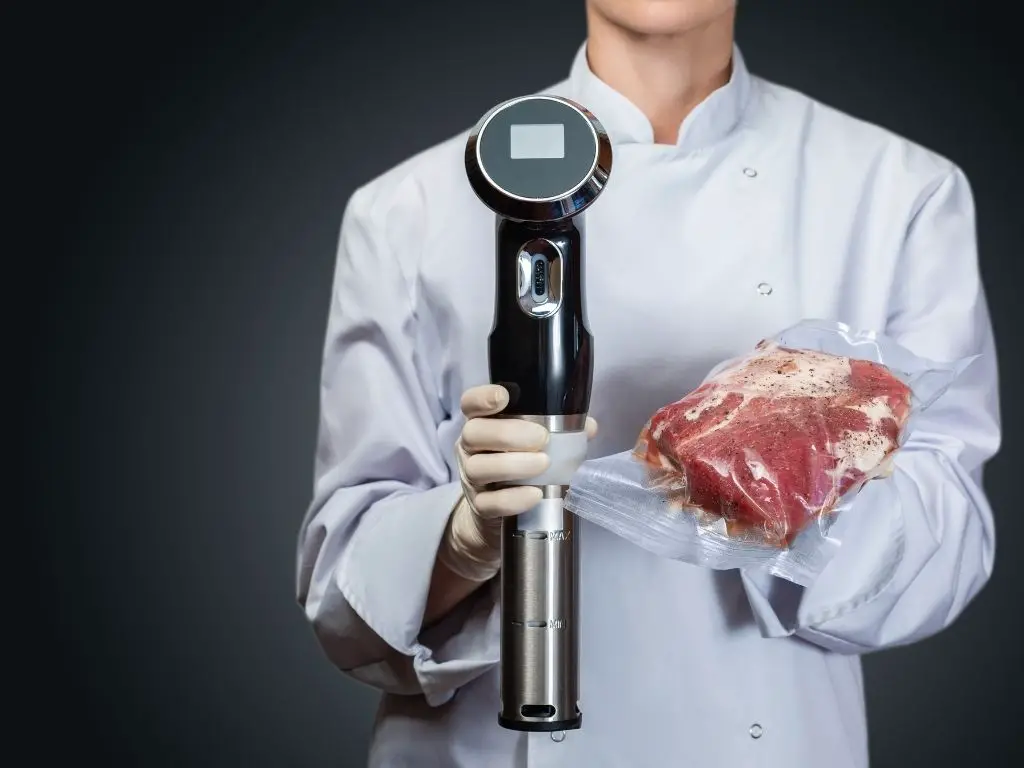Sous vide cooking has become an increasingly popular method for cooking meat in recent years. With this low and slow technique, meat is vacuum sealed in plastic and cooked at precise, consistent temperatures in a water bath. But does sous vide cooking actually make the meat taste better compared to other cooking methods? There are several factors to consider when evaluating the impact of sous vide on meat flavor.

Sous Vide Products I Use Every Day
As an Amazon affiliate, I earn from qualifying purchases.
Last update on 2025-04-02 / Affiliate links / Images from Amazon Product Advertising API
Impact on Flavor
One of the main appeals of sous vide is that it allows meat to be cooked below the temperature that would normally cause the proteins to seize up and squeeze out moisture. Cooking at a lower temperature enables the meat to retain more of its natural juices and moisture. This can lead to more tender, flavorful results.
Sous vide cooking also minimizes the loss of volatile aromatic compounds. When meat is cooked at high temperatures, whether grilling, roasting, or pan searing, many of the volatile compounds that contribute to the complex flavors and aromas evaporate. With sous vide, the sealed bag helps trap and infuse these subtle flavors back into the meat.
Enzymatic activity can also lead to more intense flavors in sous vide meat. When meat is held at warm temperatures (122°F to 150°F) for extended periods, naturally occurring enzymes break down connective tissues and tenderize the meat. These enzymatic reactions produce savory-tasting compounds that enhance the umami and beefy flavors.
Overall, sous vide cooking emphasizes retaining and enhancing the inherent flavors of the meat through controlled, low temperatures. The meat can develop a more concentrated, nuanced, and mellow flavor profile.
Impact on Texture
In addition to flavor, sous vide cooking can greatly improve the texture of meat. Cooking at precise temperatures guarantees the meat will be cooked perfectly edge-to-edge with no overcooked portions. The resulting texture is consistently tender and moist.
For tough cuts with a lot of collagen, sous vide dissolves the collagen into gelatin without overcooking the meat. This makes the meat incredibly succulent and buttery soft.
Searing or quickly grilling the exterior of the meat after sous vide provides a nice contrast of crispiness that complements the interior tenderness. Overall, sous vide leads to exceptionally velvety and luscious texture.
Impact on Aroma
Juiciness and moisture are not the only benefits when it comes to the aroma of sous vide meat. As previously mentioned, sous vide does a better job of retaining the natural aromas of the meat that are often lost through high heat cooking methods.
When searing meat after sous vide, a caramelized, roasty aroma develops on the exterior from the Maillard reaction. This adds another layer of appetizing scent that complements the meatiness coming from the interior.
In general, the aromas from sous vide meat will be more subtle yet complex, often described as intoxicating and mouthwatering.
Impact on Appearance
Sous vide will not necessarily make the meat look any more appealing. In fact, some people are deterred by the anemic, pale appearance of meat straight out of the water bath.
However, once the meat is seared or torched at the end, the exterior develops the appealing browned crust and caramelized bits expected with cooked meat. The interior will maintain a vibrant pink or rosy red color suggestive of juiciness and doneness.
While appearance may not be significantly enhanced, it can still signal the succulent, tender meat achieved through sous vide.
Comparing Sous Vide Cooking to Traditional Cooking Methods
To better evaluate whether sous vide makes meat taste better, it helps to compare it directly against other cooking techniques:
Grilling
Grilling imparts a delicious smoky char but can cause meat to be overcooked or dried out. Sous vide ensures more even doneness and moisture. However, some of the sizzling drippings and crisp crust are lost.
Roasting
Roasting relies on indirect heat and is gentler than grilling, but the exterior can still overcook. Inside, juices are lost as meat proteins contract. Sous vide cooking allows better moisture retention.
Pan Searing
Seared meat develops fantastic caramelized flavor but has a narrow window before meat goes from seared to scorched. Sous vide removes the risk of overcooking.
Braising
Braising tenderizes tough cuts, but it’s a wet cooking method that dilutes meaty flavors. Sous vide infuses more concentrated, intense flavor into the meat.
Slow Cooking
Slow cooking makes meat fall-apart tender, but can dry it out and doesn’t brown or caramelize. Sous vide offers the ideal balance of tender and moist.
Conclusion: Does Sous Vide Make Meat Taste Better?
Based on the benefits to flavor, texture, aroma, and appearance, sous vide cooking does enhance most qualities related to the taste of meat. It locks in moisture and intensifies flavor through controlled, low temperature cooking. The results are succulent, tender meat with complex notes and luscious mouthfeel.
However, traditional high-heat methods can still develop delicious qualities like smoky char and crisp crust. The unmatched flavor layers achieved through proper searing and seasoning after sous vide are key. In the end, sous vide won’t inherently make any cut of meat taste phenomenal, but it powerfully enables cooks to realize the full potential flavor.


![IMPRESA [10 Pack] Sous Vide Magnet Weights for Keeping Bags Submerged – Sous Vide Accessories to Stop Floating Bags & Undercooking – Weighted Magnets for Containers](https://m.media-amazon.com/images/I/41zHpl8G2lL._SL160_.jpg)

